Organisational Behaviour and Leadership: BBC Case Study Report
VerifiedAdded on 2020/06/04
|14
|4800
|55
Report
AI Summary
This report provides an in-depth analysis of organisational behaviour, using the British Broadcasting Corporation (BBC) as a case study. It begins by examining how culture, power, and politics influence individual and team behaviour within the organization, referencing Handy's cultural typology and the historical context of BBC's organizational culture. The report then explores the impact of motivational theories, including Hertzberg's two-factor theory, Alderfer's ERG theory, and Maslow's hierarchy of needs, on achieving organizational goals. Furthermore, it delves into the factors that contribute to team effectiveness, such as different team types and Tuckman's team evolution model. Finally, it applies concepts of organisational behaviour, specifically focusing on leadership path-goal theory and identifying barriers to effective team performance within the BBC. The report highlights how these elements shape employee behavior and organizational outcomes, providing a comprehensive view of leadership and management practices.
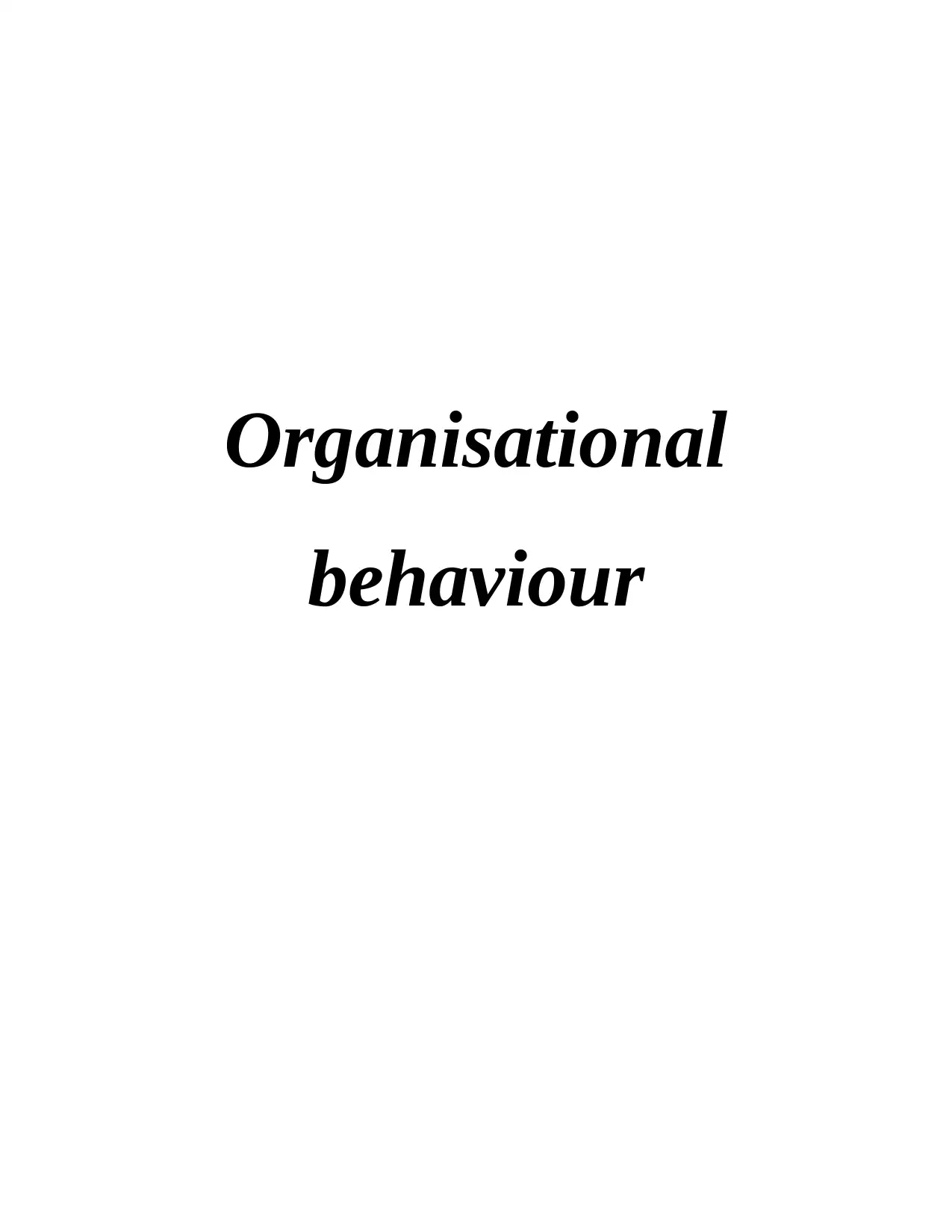
Organisational
behaviour
behaviour
Paraphrase This Document
Need a fresh take? Get an instant paraphrase of this document with our AI Paraphraser
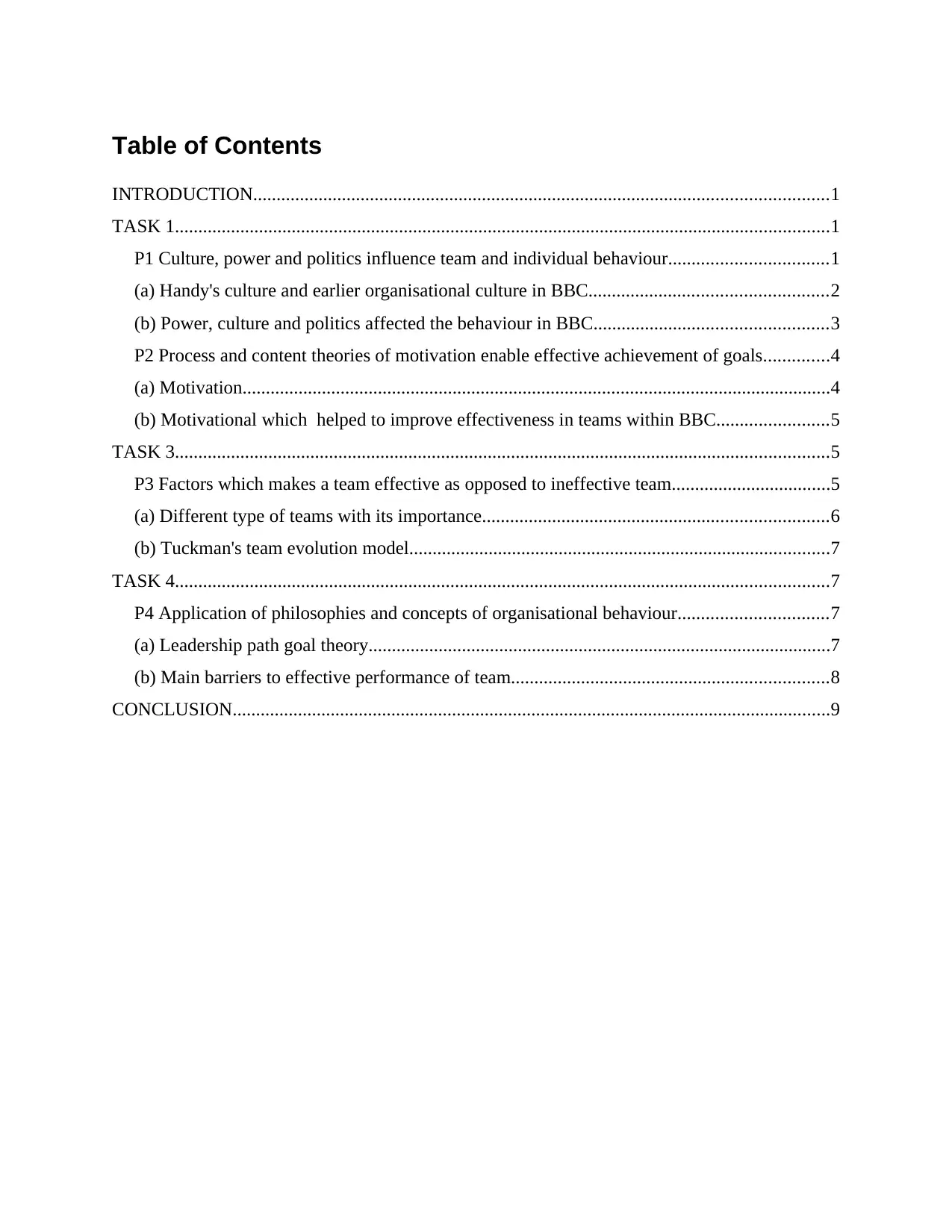
Table of Contents
INTRODUCTION...........................................................................................................................1
TASK 1............................................................................................................................................1
P1 Culture, power and politics influence team and individual behaviour..................................1
(a) Handy's culture and earlier organisational culture in BBC...................................................2
(b) Power, culture and politics affected the behaviour in BBC..................................................3
P2 Process and content theories of motivation enable effective achievement of goals..............4
(a) Motivation..............................................................................................................................4
(b) Motivational which helped to improve effectiveness in teams within BBC........................5
TASK 3............................................................................................................................................5
P3 Factors which makes a team effective as opposed to ineffective team..................................5
(a) Different type of teams with its importance..........................................................................6
(b) Tuckman's team evolution model..........................................................................................7
TASK 4............................................................................................................................................7
P4 Application of philosophies and concepts of organisational behaviour................................7
(a) Leadership path goal theory...................................................................................................7
(b) Main barriers to effective performance of team....................................................................8
CONCLUSION................................................................................................................................9
INTRODUCTION...........................................................................................................................1
TASK 1............................................................................................................................................1
P1 Culture, power and politics influence team and individual behaviour..................................1
(a) Handy's culture and earlier organisational culture in BBC...................................................2
(b) Power, culture and politics affected the behaviour in BBC..................................................3
P2 Process and content theories of motivation enable effective achievement of goals..............4
(a) Motivation..............................................................................................................................4
(b) Motivational which helped to improve effectiveness in teams within BBC........................5
TASK 3............................................................................................................................................5
P3 Factors which makes a team effective as opposed to ineffective team..................................5
(a) Different type of teams with its importance..........................................................................6
(b) Tuckman's team evolution model..........................................................................................7
TASK 4............................................................................................................................................7
P4 Application of philosophies and concepts of organisational behaviour................................7
(a) Leadership path goal theory...................................................................................................7
(b) Main barriers to effective performance of team....................................................................8
CONCLUSION................................................................................................................................9
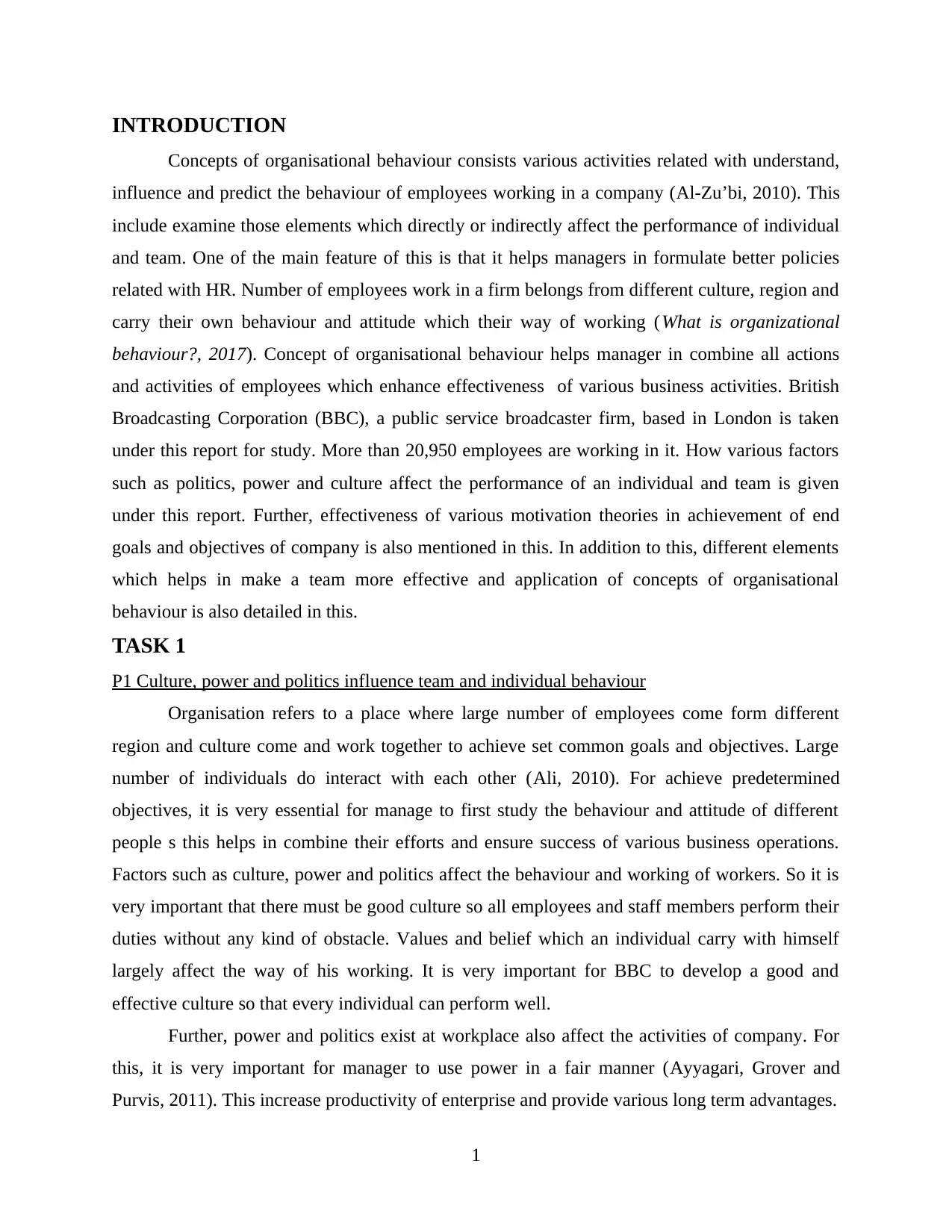
INTRODUCTION
Concepts of organisational behaviour consists various activities related with understand,
influence and predict the behaviour of employees working in a company (Al-Zu’bi, 2010). This
include examine those elements which directly or indirectly affect the performance of individual
and team. One of the main feature of this is that it helps managers in formulate better policies
related with HR. Number of employees work in a firm belongs from different culture, region and
carry their own behaviour and attitude which their way of working (What is organizational
behaviour?, 2017). Concept of organisational behaviour helps manager in combine all actions
and activities of employees which enhance effectiveness of various business activities. British
Broadcasting Corporation (BBC), a public service broadcaster firm, based in London is taken
under this report for study. More than 20,950 employees are working in it. How various factors
such as politics, power and culture affect the performance of an individual and team is given
under this report. Further, effectiveness of various motivation theories in achievement of end
goals and objectives of company is also mentioned in this. In addition to this, different elements
which helps in make a team more effective and application of concepts of organisational
behaviour is also detailed in this.
TASK 1
P1 Culture, power and politics influence team and individual behaviour
Organisation refers to a place where large number of employees come form different
region and culture come and work together to achieve set common goals and objectives. Large
number of individuals do interact with each other (Ali, 2010). For achieve predetermined
objectives, it is very essential for manage to first study the behaviour and attitude of different
people s this helps in combine their efforts and ensure success of various business operations.
Factors such as culture, power and politics affect the behaviour and working of workers. So it is
very important that there must be good culture so all employees and staff members perform their
duties without any kind of obstacle. Values and belief which an individual carry with himself
largely affect the way of his working. It is very important for BBC to develop a good and
effective culture so that every individual can perform well.
Further, power and politics exist at workplace also affect the activities of company. For
this, it is very important for manager to use power in a fair manner (Ayyagari, Grover and
Purvis, 2011). This increase productivity of enterprise and provide various long term advantages.
1
Concepts of organisational behaviour consists various activities related with understand,
influence and predict the behaviour of employees working in a company (Al-Zu’bi, 2010). This
include examine those elements which directly or indirectly affect the performance of individual
and team. One of the main feature of this is that it helps managers in formulate better policies
related with HR. Number of employees work in a firm belongs from different culture, region and
carry their own behaviour and attitude which their way of working (What is organizational
behaviour?, 2017). Concept of organisational behaviour helps manager in combine all actions
and activities of employees which enhance effectiveness of various business activities. British
Broadcasting Corporation (BBC), a public service broadcaster firm, based in London is taken
under this report for study. More than 20,950 employees are working in it. How various factors
such as politics, power and culture affect the performance of an individual and team is given
under this report. Further, effectiveness of various motivation theories in achievement of end
goals and objectives of company is also mentioned in this. In addition to this, different elements
which helps in make a team more effective and application of concepts of organisational
behaviour is also detailed in this.
TASK 1
P1 Culture, power and politics influence team and individual behaviour
Organisation refers to a place where large number of employees come form different
region and culture come and work together to achieve set common goals and objectives. Large
number of individuals do interact with each other (Ali, 2010). For achieve predetermined
objectives, it is very essential for manage to first study the behaviour and attitude of different
people s this helps in combine their efforts and ensure success of various business operations.
Factors such as culture, power and politics affect the behaviour and working of workers. So it is
very important that there must be good culture so all employees and staff members perform their
duties without any kind of obstacle. Values and belief which an individual carry with himself
largely affect the way of his working. It is very important for BBC to develop a good and
effective culture so that every individual can perform well.
Further, power and politics exist at workplace also affect the activities of company. For
this, it is very important for manager to use power in a fair manner (Ayyagari, Grover and
Purvis, 2011). This increase productivity of enterprise and provide various long term advantages.
1
⊘ This is a preview!⊘
Do you want full access?
Subscribe today to unlock all pages.

Trusted by 1+ million students worldwide
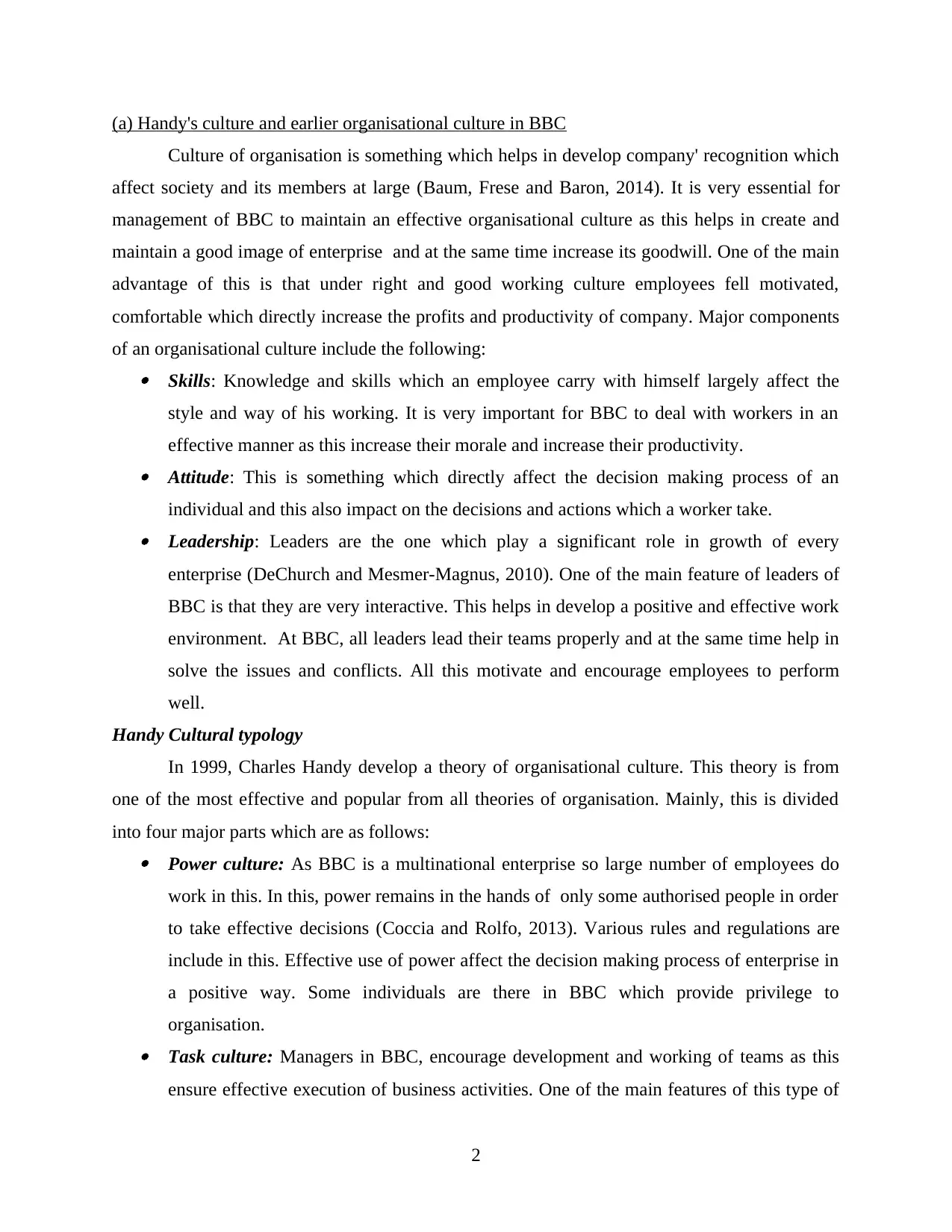
(a) Handy's culture and earlier organisational culture in BBC
Culture of organisation is something which helps in develop company' recognition which
affect society and its members at large (Baum, Frese and Baron, 2014). It is very essential for
management of BBC to maintain an effective organisational culture as this helps in create and
maintain a good image of enterprise and at the same time increase its goodwill. One of the main
advantage of this is that under right and good working culture employees fell motivated,
comfortable which directly increase the profits and productivity of company. Major components
of an organisational culture include the following: Skills: Knowledge and skills which an employee carry with himself largely affect the
style and way of his working. It is very important for BBC to deal with workers in an
effective manner as this increase their morale and increase their productivity. Attitude: This is something which directly affect the decision making process of an
individual and this also impact on the decisions and actions which a worker take. Leadership: Leaders are the one which play a significant role in growth of every
enterprise (DeChurch and Mesmer-Magnus, 2010). One of the main feature of leaders of
BBC is that they are very interactive. This helps in develop a positive and effective work
environment. At BBC, all leaders lead their teams properly and at the same time help in
solve the issues and conflicts. All this motivate and encourage employees to perform
well.
Handy Cultural typology
In 1999, Charles Handy develop a theory of organisational culture. This theory is from
one of the most effective and popular from all theories of organisation. Mainly, this is divided
into four major parts which are as follows: Power culture: As BBC is a multinational enterprise so large number of employees do
work in this. In this, power remains in the hands of only some authorised people in order
to take effective decisions (Coccia and Rolfo, 2013). Various rules and regulations are
include in this. Effective use of power affect the decision making process of enterprise in
a positive way. Some individuals are there in BBC which provide privilege to
organisation. Task culture: Managers in BBC, encourage development and working of teams as this
ensure effective execution of business activities. One of the main features of this type of
2
Culture of organisation is something which helps in develop company' recognition which
affect society and its members at large (Baum, Frese and Baron, 2014). It is very essential for
management of BBC to maintain an effective organisational culture as this helps in create and
maintain a good image of enterprise and at the same time increase its goodwill. One of the main
advantage of this is that under right and good working culture employees fell motivated,
comfortable which directly increase the profits and productivity of company. Major components
of an organisational culture include the following: Skills: Knowledge and skills which an employee carry with himself largely affect the
style and way of his working. It is very important for BBC to deal with workers in an
effective manner as this increase their morale and increase their productivity. Attitude: This is something which directly affect the decision making process of an
individual and this also impact on the decisions and actions which a worker take. Leadership: Leaders are the one which play a significant role in growth of every
enterprise (DeChurch and Mesmer-Magnus, 2010). One of the main feature of leaders of
BBC is that they are very interactive. This helps in develop a positive and effective work
environment. At BBC, all leaders lead their teams properly and at the same time help in
solve the issues and conflicts. All this motivate and encourage employees to perform
well.
Handy Cultural typology
In 1999, Charles Handy develop a theory of organisational culture. This theory is from
one of the most effective and popular from all theories of organisation. Mainly, this is divided
into four major parts which are as follows: Power culture: As BBC is a multinational enterprise so large number of employees do
work in this. In this, power remains in the hands of only some authorised people in order
to take effective decisions (Coccia and Rolfo, 2013). Various rules and regulations are
include in this. Effective use of power affect the decision making process of enterprise in
a positive way. Some individuals are there in BBC which provide privilege to
organisation. Task culture: Managers in BBC, encourage development and working of teams as this
ensure effective execution of business activities. One of the main features of this type of
2
Paraphrase This Document
Need a fresh take? Get an instant paraphrase of this document with our AI Paraphraser
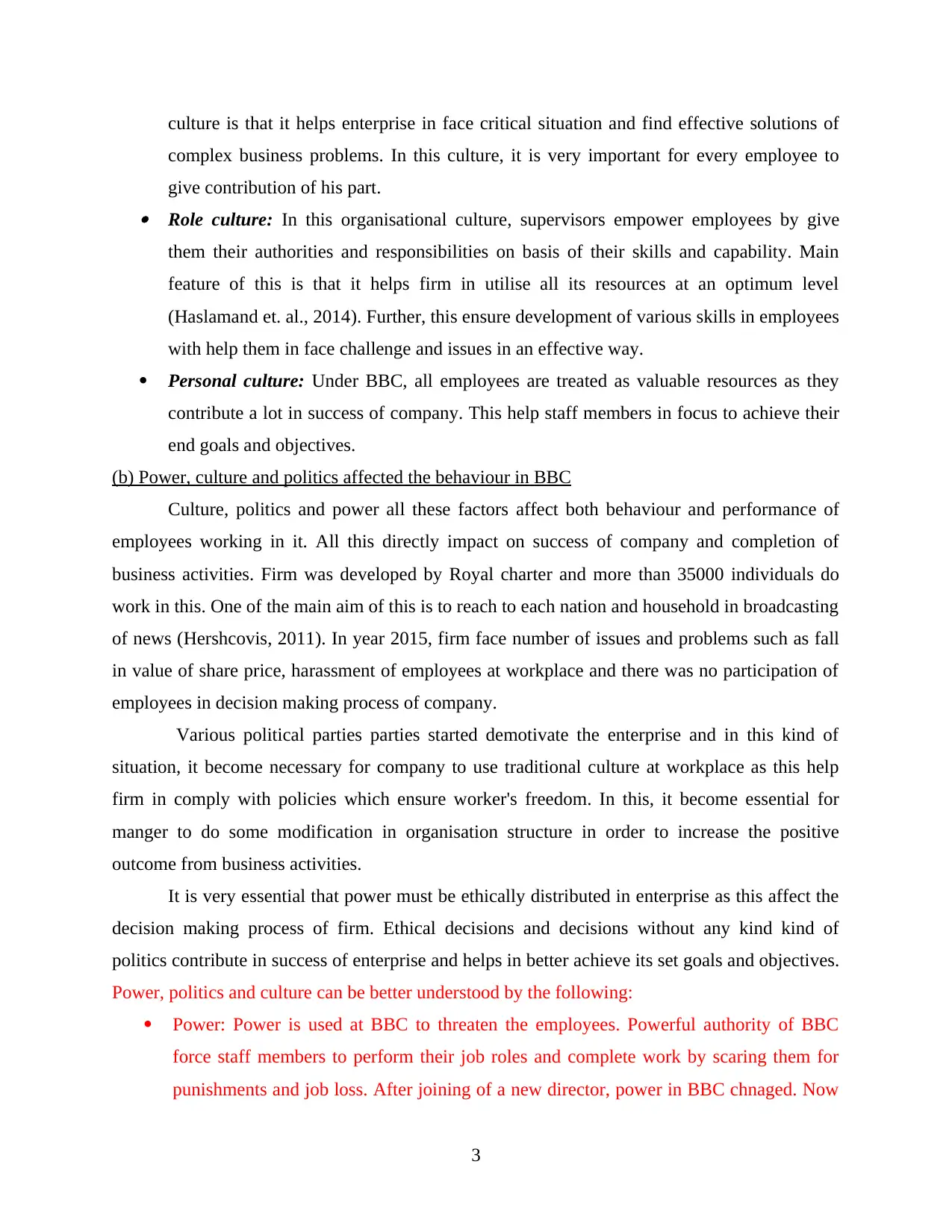
culture is that it helps enterprise in face critical situation and find effective solutions of
complex business problems. In this culture, it is very important for every employee to
give contribution of his part. Role culture: In this organisational culture, supervisors empower employees by give
them their authorities and responsibilities on basis of their skills and capability. Main
feature of this is that it helps firm in utilise all its resources at an optimum level
(Haslamand et. al., 2014). Further, this ensure development of various skills in employees
with help them in face challenge and issues in an effective way.
Personal culture: Under BBC, all employees are treated as valuable resources as they
contribute a lot in success of company. This help staff members in focus to achieve their
end goals and objectives.
(b) Power, culture and politics affected the behaviour in BBC
Culture, politics and power all these factors affect both behaviour and performance of
employees working in it. All this directly impact on success of company and completion of
business activities. Firm was developed by Royal charter and more than 35000 individuals do
work in this. One of the main aim of this is to reach to each nation and household in broadcasting
of news (Hershcovis, 2011). In year 2015, firm face number of issues and problems such as fall
in value of share price, harassment of employees at workplace and there was no participation of
employees in decision making process of company.
Various political parties parties started demotivate the enterprise and in this kind of
situation, it become necessary for company to use traditional culture at workplace as this help
firm in comply with policies which ensure worker's freedom. In this, it become essential for
manger to do some modification in organisation structure in order to increase the positive
outcome from business activities.
It is very essential that power must be ethically distributed in enterprise as this affect the
decision making process of firm. Ethical decisions and decisions without any kind kind of
politics contribute in success of enterprise and helps in better achieve its set goals and objectives.
Power, politics and culture can be better understood by the following:
Power: Power is used at BBC to threaten the employees. Powerful authority of BBC
force staff members to perform their job roles and complete work by scaring them for
punishments and job loss. After joining of a new director, power in BBC chnaged. Now
3
complex business problems. In this culture, it is very important for every employee to
give contribution of his part. Role culture: In this organisational culture, supervisors empower employees by give
them their authorities and responsibilities on basis of their skills and capability. Main
feature of this is that it helps firm in utilise all its resources at an optimum level
(Haslamand et. al., 2014). Further, this ensure development of various skills in employees
with help them in face challenge and issues in an effective way.
Personal culture: Under BBC, all employees are treated as valuable resources as they
contribute a lot in success of company. This help staff members in focus to achieve their
end goals and objectives.
(b) Power, culture and politics affected the behaviour in BBC
Culture, politics and power all these factors affect both behaviour and performance of
employees working in it. All this directly impact on success of company and completion of
business activities. Firm was developed by Royal charter and more than 35000 individuals do
work in this. One of the main aim of this is to reach to each nation and household in broadcasting
of news (Hershcovis, 2011). In year 2015, firm face number of issues and problems such as fall
in value of share price, harassment of employees at workplace and there was no participation of
employees in decision making process of company.
Various political parties parties started demotivate the enterprise and in this kind of
situation, it become necessary for company to use traditional culture at workplace as this help
firm in comply with policies which ensure worker's freedom. In this, it become essential for
manger to do some modification in organisation structure in order to increase the positive
outcome from business activities.
It is very essential that power must be ethically distributed in enterprise as this affect the
decision making process of firm. Ethical decisions and decisions without any kind kind of
politics contribute in success of enterprise and helps in better achieve its set goals and objectives.
Power, politics and culture can be better understood by the following:
Power: Power is used at BBC to threaten the employees. Powerful authority of BBC
force staff members to perform their job roles and complete work by scaring them for
punishments and job loss. After joining of a new director, power in BBC chnaged. Now
3
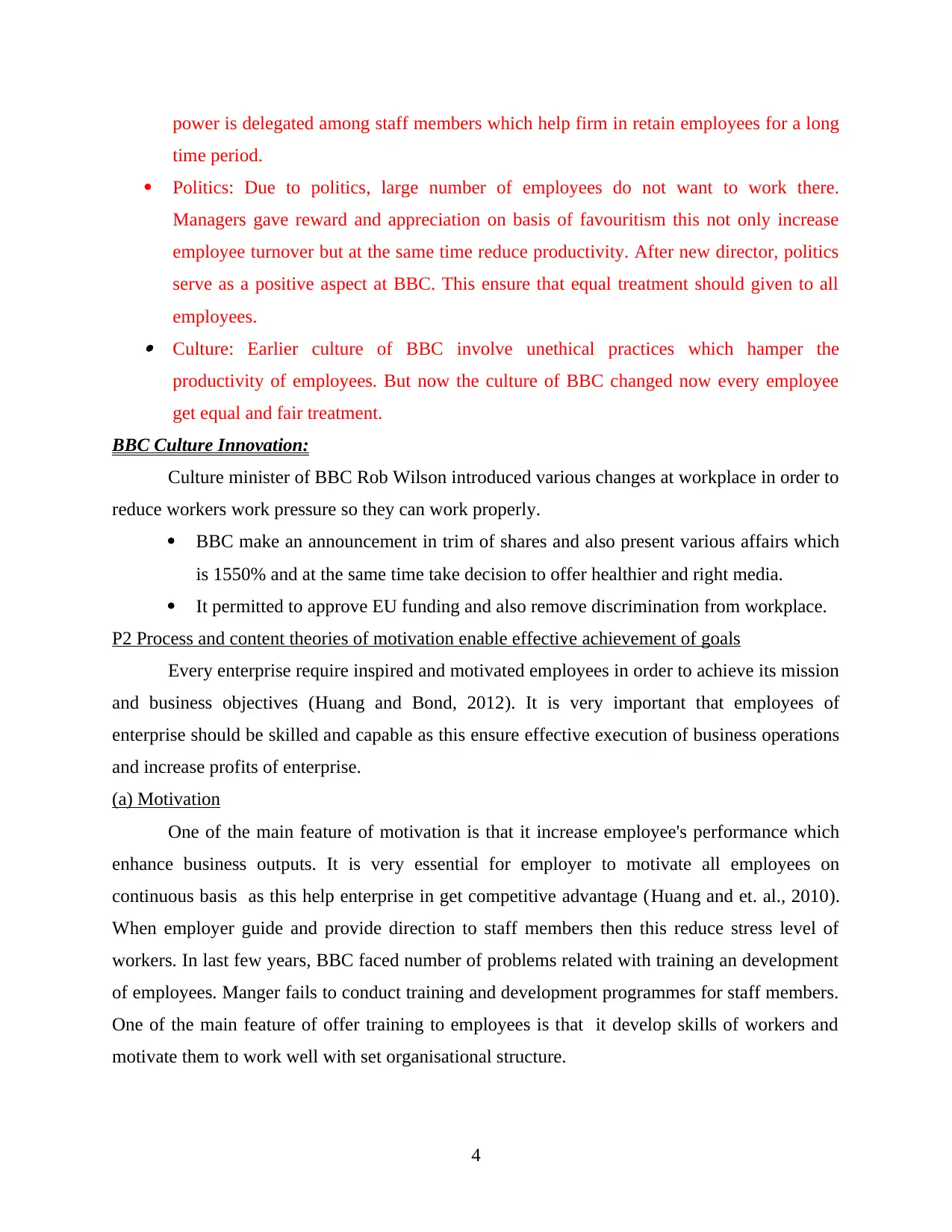
power is delegated among staff members which help firm in retain employees for a long
time period.
Politics: Due to politics, large number of employees do not want to work there.
Managers gave reward and appreciation on basis of favouritism this not only increase
employee turnover but at the same time reduce productivity. After new director, politics
serve as a positive aspect at BBC. This ensure that equal treatment should given to all
employees. Culture: Earlier culture of BBC involve unethical practices which hamper the
productivity of employees. But now the culture of BBC changed now every employee
get equal and fair treatment.
BBC Culture Innovation:
Culture minister of BBC Rob Wilson introduced various changes at workplace in order to
reduce workers work pressure so they can work properly.
BBC make an announcement in trim of shares and also present various affairs which
is 1550% and at the same time take decision to offer healthier and right media.
It permitted to approve EU funding and also remove discrimination from workplace.
P2 Process and content theories of motivation enable effective achievement of goals
Every enterprise require inspired and motivated employees in order to achieve its mission
and business objectives (Huang and Bond, 2012). It is very important that employees of
enterprise should be skilled and capable as this ensure effective execution of business operations
and increase profits of enterprise.
(a) Motivation
One of the main feature of motivation is that it increase employee's performance which
enhance business outputs. It is very essential for employer to motivate all employees on
continuous basis as this help enterprise in get competitive advantage (Huang and et. al., 2010).
When employer guide and provide direction to staff members then this reduce stress level of
workers. In last few years, BBC faced number of problems related with training an development
of employees. Manger fails to conduct training and development programmes for staff members.
One of the main feature of offer training to employees is that it develop skills of workers and
motivate them to work well with set organisational structure.
4
time period.
Politics: Due to politics, large number of employees do not want to work there.
Managers gave reward and appreciation on basis of favouritism this not only increase
employee turnover but at the same time reduce productivity. After new director, politics
serve as a positive aspect at BBC. This ensure that equal treatment should given to all
employees. Culture: Earlier culture of BBC involve unethical practices which hamper the
productivity of employees. But now the culture of BBC changed now every employee
get equal and fair treatment.
BBC Culture Innovation:
Culture minister of BBC Rob Wilson introduced various changes at workplace in order to
reduce workers work pressure so they can work properly.
BBC make an announcement in trim of shares and also present various affairs which
is 1550% and at the same time take decision to offer healthier and right media.
It permitted to approve EU funding and also remove discrimination from workplace.
P2 Process and content theories of motivation enable effective achievement of goals
Every enterprise require inspired and motivated employees in order to achieve its mission
and business objectives (Huang and Bond, 2012). It is very important that employees of
enterprise should be skilled and capable as this ensure effective execution of business operations
and increase profits of enterprise.
(a) Motivation
One of the main feature of motivation is that it increase employee's performance which
enhance business outputs. It is very essential for employer to motivate all employees on
continuous basis as this help enterprise in get competitive advantage (Huang and et. al., 2010).
When employer guide and provide direction to staff members then this reduce stress level of
workers. In last few years, BBC faced number of problems related with training an development
of employees. Manger fails to conduct training and development programmes for staff members.
One of the main feature of offer training to employees is that it develop skills of workers and
motivate them to work well with set organisational structure.
4
⊘ This is a preview!⊘
Do you want full access?
Subscribe today to unlock all pages.

Trusted by 1+ million students worldwide
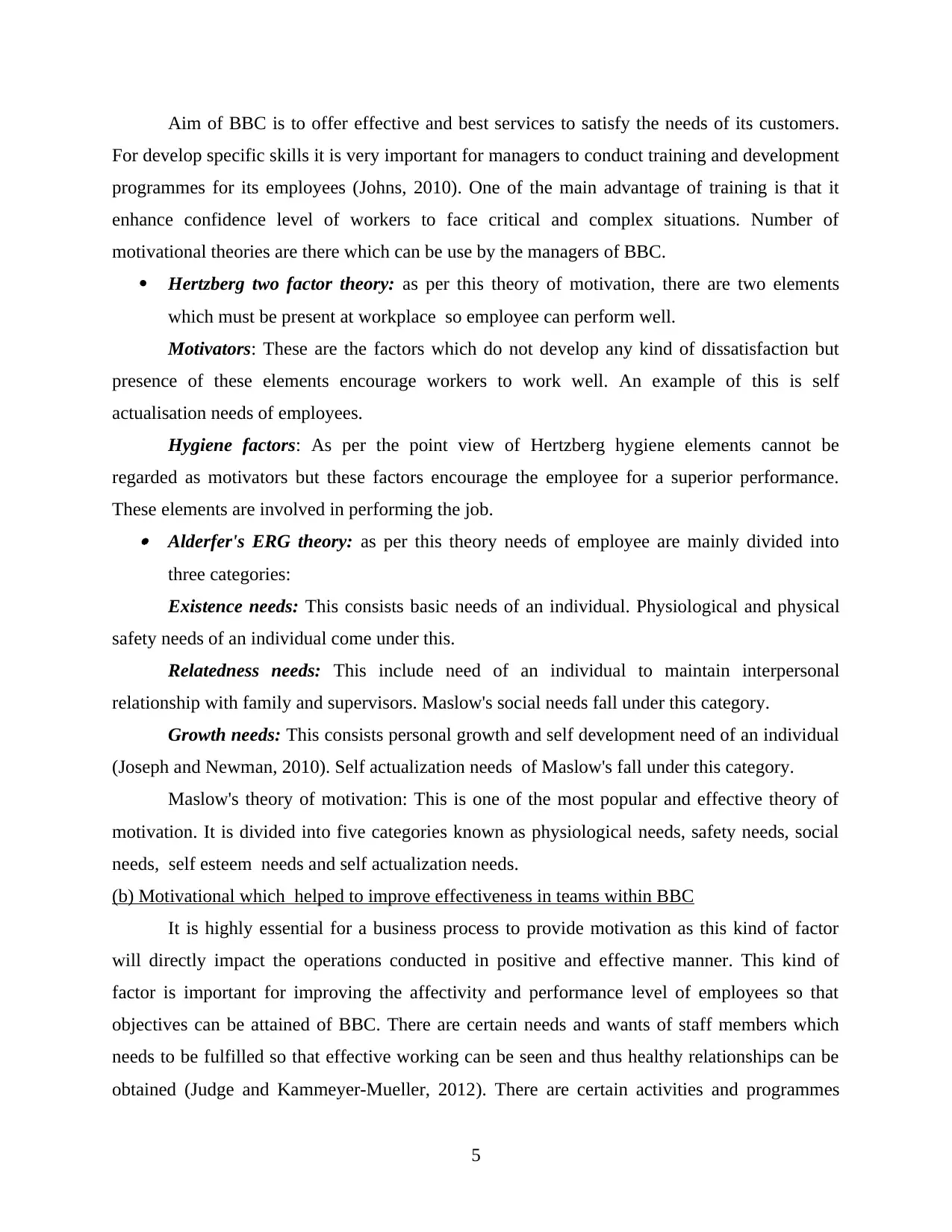
Aim of BBC is to offer effective and best services to satisfy the needs of its customers.
For develop specific skills it is very important for managers to conduct training and development
programmes for its employees (Johns, 2010). One of the main advantage of training is that it
enhance confidence level of workers to face critical and complex situations. Number of
motivational theories are there which can be use by the managers of BBC.
Hertzberg two factor theory: as per this theory of motivation, there are two elements
which must be present at workplace so employee can perform well.
Motivators: These are the factors which do not develop any kind of dissatisfaction but
presence of these elements encourage workers to work well. An example of this is self
actualisation needs of employees.
Hygiene factors: As per the point view of Hertzberg hygiene elements cannot be
regarded as motivators but these factors encourage the employee for a superior performance.
These elements are involved in performing the job. Alderfer's ERG theory: as per this theory needs of employee are mainly divided into
three categories:
Existence needs: This consists basic needs of an individual. Physiological and physical
safety needs of an individual come under this.
Relatedness needs: This include need of an individual to maintain interpersonal
relationship with family and supervisors. Maslow's social needs fall under this category.
Growth needs: This consists personal growth and self development need of an individual
(Joseph and Newman, 2010). Self actualization needs of Maslow's fall under this category.
Maslow's theory of motivation: This is one of the most popular and effective theory of
motivation. It is divided into five categories known as physiological needs, safety needs, social
needs, self esteem needs and self actualization needs.
(b) Motivational which helped to improve effectiveness in teams within BBC
It is highly essential for a business process to provide motivation as this kind of factor
will directly impact the operations conducted in positive and effective manner. This kind of
factor is important for improving the affectivity and performance level of employees so that
objectives can be attained of BBC. There are certain needs and wants of staff members which
needs to be fulfilled so that effective working can be seen and thus healthy relationships can be
obtained (Judge and Kammeyer‐Mueller, 2012). There are certain activities and programmes
5
For develop specific skills it is very important for managers to conduct training and development
programmes for its employees (Johns, 2010). One of the main advantage of training is that it
enhance confidence level of workers to face critical and complex situations. Number of
motivational theories are there which can be use by the managers of BBC.
Hertzberg two factor theory: as per this theory of motivation, there are two elements
which must be present at workplace so employee can perform well.
Motivators: These are the factors which do not develop any kind of dissatisfaction but
presence of these elements encourage workers to work well. An example of this is self
actualisation needs of employees.
Hygiene factors: As per the point view of Hertzberg hygiene elements cannot be
regarded as motivators but these factors encourage the employee for a superior performance.
These elements are involved in performing the job. Alderfer's ERG theory: as per this theory needs of employee are mainly divided into
three categories:
Existence needs: This consists basic needs of an individual. Physiological and physical
safety needs of an individual come under this.
Relatedness needs: This include need of an individual to maintain interpersonal
relationship with family and supervisors. Maslow's social needs fall under this category.
Growth needs: This consists personal growth and self development need of an individual
(Joseph and Newman, 2010). Self actualization needs of Maslow's fall under this category.
Maslow's theory of motivation: This is one of the most popular and effective theory of
motivation. It is divided into five categories known as physiological needs, safety needs, social
needs, self esteem needs and self actualization needs.
(b) Motivational which helped to improve effectiveness in teams within BBC
It is highly essential for a business process to provide motivation as this kind of factor
will directly impact the operations conducted in positive and effective manner. This kind of
factor is important for improving the affectivity and performance level of employees so that
objectives can be attained of BBC. There are certain needs and wants of staff members which
needs to be fulfilled so that effective working can be seen and thus healthy relationships can be
obtained (Judge and Kammeyer‐Mueller, 2012). There are certain activities and programmes
5
Paraphrase This Document
Need a fresh take? Get an instant paraphrase of this document with our AI Paraphraser
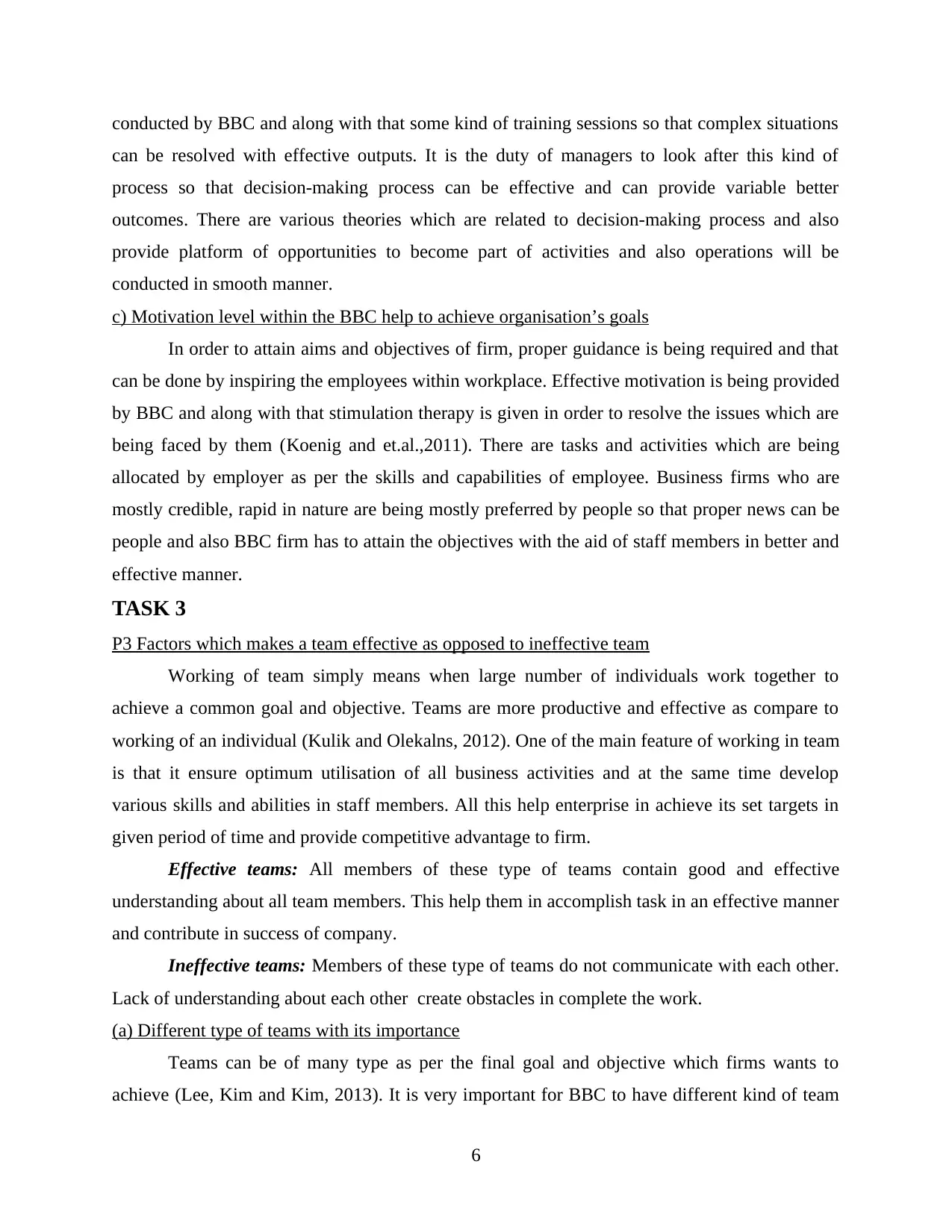
conducted by BBC and along with that some kind of training sessions so that complex situations
can be resolved with effective outputs. It is the duty of managers to look after this kind of
process so that decision-making process can be effective and can provide variable better
outcomes. There are various theories which are related to decision-making process and also
provide platform of opportunities to become part of activities and also operations will be
conducted in smooth manner.
c) Motivation level within the BBC help to achieve organisation’s goals
In order to attain aims and objectives of firm, proper guidance is being required and that
can be done by inspiring the employees within workplace. Effective motivation is being provided
by BBC and along with that stimulation therapy is given in order to resolve the issues which are
being faced by them (Koenig and et.al.,2011). There are tasks and activities which are being
allocated by employer as per the skills and capabilities of employee. Business firms who are
mostly credible, rapid in nature are being mostly preferred by people so that proper news can be
people and also BBC firm has to attain the objectives with the aid of staff members in better and
effective manner.
TASK 3
P3 Factors which makes a team effective as opposed to ineffective team
Working of team simply means when large number of individuals work together to
achieve a common goal and objective. Teams are more productive and effective as compare to
working of an individual (Kulik and Olekalns, 2012). One of the main feature of working in team
is that it ensure optimum utilisation of all business activities and at the same time develop
various skills and abilities in staff members. All this help enterprise in achieve its set targets in
given period of time and provide competitive advantage to firm.
Effective teams: All members of these type of teams contain good and effective
understanding about all team members. This help them in accomplish task in an effective manner
and contribute in success of company.
Ineffective teams: Members of these type of teams do not communicate with each other.
Lack of understanding about each other create obstacles in complete the work.
(a) Different type of teams with its importance
Teams can be of many type as per the final goal and objective which firms wants to
achieve (Lee, Kim and Kim, 2013). It is very important for BBC to have different kind of team
6
can be resolved with effective outputs. It is the duty of managers to look after this kind of
process so that decision-making process can be effective and can provide variable better
outcomes. There are various theories which are related to decision-making process and also
provide platform of opportunities to become part of activities and also operations will be
conducted in smooth manner.
c) Motivation level within the BBC help to achieve organisation’s goals
In order to attain aims and objectives of firm, proper guidance is being required and that
can be done by inspiring the employees within workplace. Effective motivation is being provided
by BBC and along with that stimulation therapy is given in order to resolve the issues which are
being faced by them (Koenig and et.al.,2011). There are tasks and activities which are being
allocated by employer as per the skills and capabilities of employee. Business firms who are
mostly credible, rapid in nature are being mostly preferred by people so that proper news can be
people and also BBC firm has to attain the objectives with the aid of staff members in better and
effective manner.
TASK 3
P3 Factors which makes a team effective as opposed to ineffective team
Working of team simply means when large number of individuals work together to
achieve a common goal and objective. Teams are more productive and effective as compare to
working of an individual (Kulik and Olekalns, 2012). One of the main feature of working in team
is that it ensure optimum utilisation of all business activities and at the same time develop
various skills and abilities in staff members. All this help enterprise in achieve its set targets in
given period of time and provide competitive advantage to firm.
Effective teams: All members of these type of teams contain good and effective
understanding about all team members. This help them in accomplish task in an effective manner
and contribute in success of company.
Ineffective teams: Members of these type of teams do not communicate with each other.
Lack of understanding about each other create obstacles in complete the work.
(a) Different type of teams with its importance
Teams can be of many type as per the final goal and objective which firms wants to
achieve (Lee, Kim and Kim, 2013). It is very important for BBC to have different kind of team
6
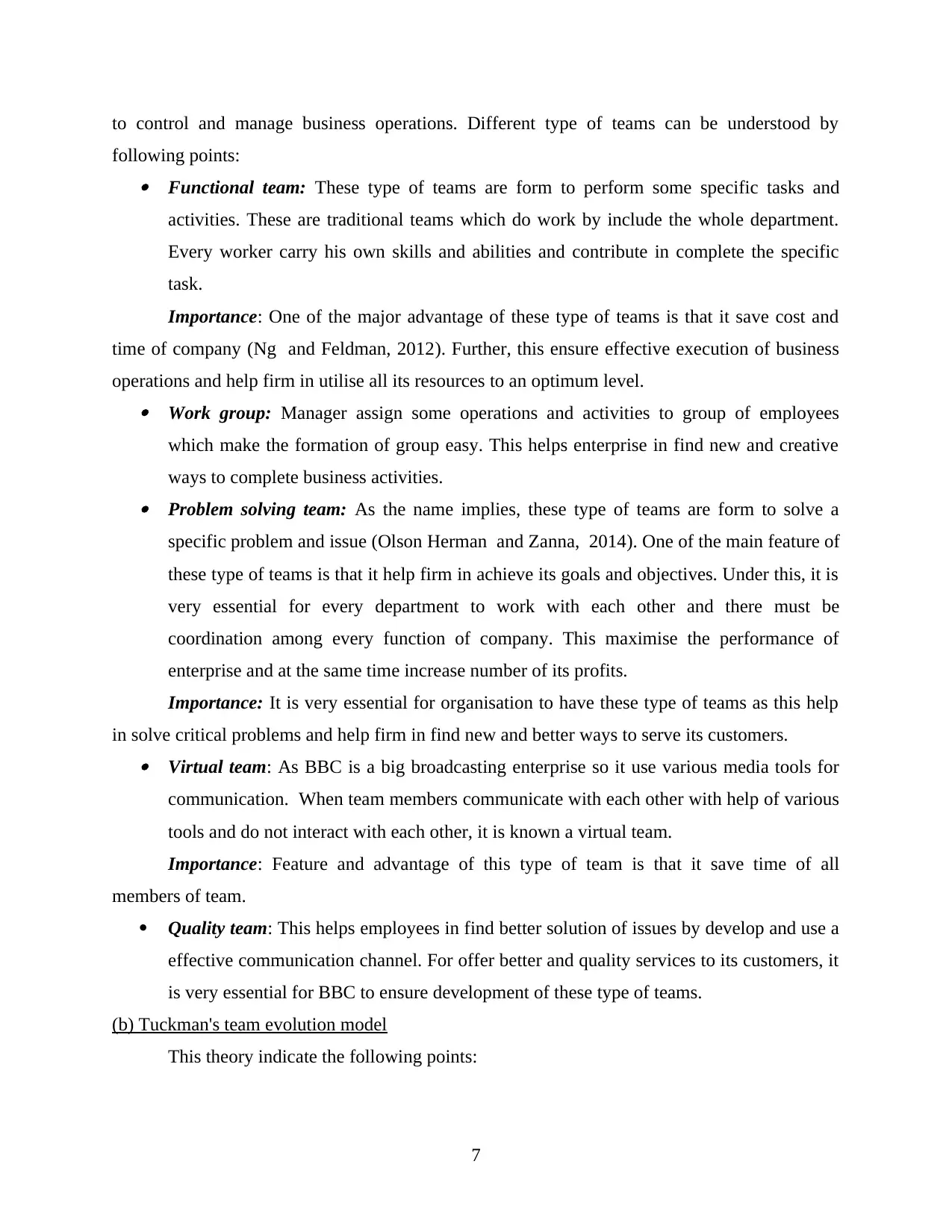
to control and manage business operations. Different type of teams can be understood by
following points: Functional team: These type of teams are form to perform some specific tasks and
activities. These are traditional teams which do work by include the whole department.
Every worker carry his own skills and abilities and contribute in complete the specific
task.
Importance: One of the major advantage of these type of teams is that it save cost and
time of company (Ng and Feldman, 2012). Further, this ensure effective execution of business
operations and help firm in utilise all its resources to an optimum level. Work group: Manager assign some operations and activities to group of employees
which make the formation of group easy. This helps enterprise in find new and creative
ways to complete business activities. Problem solving team: As the name implies, these type of teams are form to solve a
specific problem and issue (Olson Herman and Zanna, 2014). One of the main feature of
these type of teams is that it help firm in achieve its goals and objectives. Under this, it is
very essential for every department to work with each other and there must be
coordination among every function of company. This maximise the performance of
enterprise and at the same time increase number of its profits.
Importance: It is very essential for organisation to have these type of teams as this help
in solve critical problems and help firm in find new and better ways to serve its customers. Virtual team: As BBC is a big broadcasting enterprise so it use various media tools for
communication. When team members communicate with each other with help of various
tools and do not interact with each other, it is known a virtual team.
Importance: Feature and advantage of this type of team is that it save time of all
members of team.
Quality team: This helps employees in find better solution of issues by develop and use a
effective communication channel. For offer better and quality services to its customers, it
is very essential for BBC to ensure development of these type of teams.
(b) Tuckman's team evolution model
This theory indicate the following points:
7
following points: Functional team: These type of teams are form to perform some specific tasks and
activities. These are traditional teams which do work by include the whole department.
Every worker carry his own skills and abilities and contribute in complete the specific
task.
Importance: One of the major advantage of these type of teams is that it save cost and
time of company (Ng and Feldman, 2012). Further, this ensure effective execution of business
operations and help firm in utilise all its resources to an optimum level. Work group: Manager assign some operations and activities to group of employees
which make the formation of group easy. This helps enterprise in find new and creative
ways to complete business activities. Problem solving team: As the name implies, these type of teams are form to solve a
specific problem and issue (Olson Herman and Zanna, 2014). One of the main feature of
these type of teams is that it help firm in achieve its goals and objectives. Under this, it is
very essential for every department to work with each other and there must be
coordination among every function of company. This maximise the performance of
enterprise and at the same time increase number of its profits.
Importance: It is very essential for organisation to have these type of teams as this help
in solve critical problems and help firm in find new and better ways to serve its customers. Virtual team: As BBC is a big broadcasting enterprise so it use various media tools for
communication. When team members communicate with each other with help of various
tools and do not interact with each other, it is known a virtual team.
Importance: Feature and advantage of this type of team is that it save time of all
members of team.
Quality team: This helps employees in find better solution of issues by develop and use a
effective communication channel. For offer better and quality services to its customers, it
is very essential for BBC to ensure development of these type of teams.
(b) Tuckman's team evolution model
This theory indicate the following points:
7
⊘ This is a preview!⊘
Do you want full access?
Subscribe today to unlock all pages.

Trusted by 1+ million students worldwide
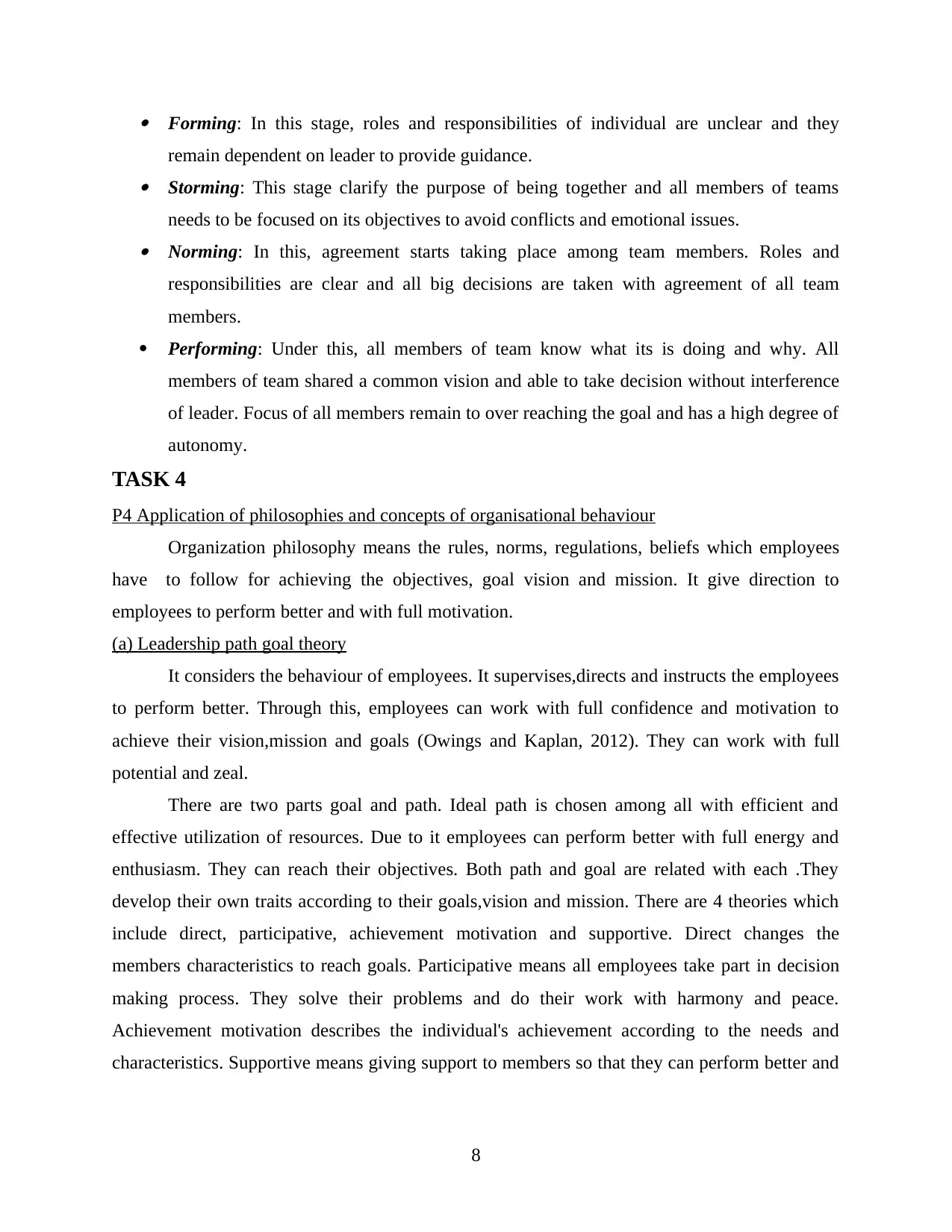
Forming: In this stage, roles and responsibilities of individual are unclear and they
remain dependent on leader to provide guidance. Storming: This stage clarify the purpose of being together and all members of teams
needs to be focused on its objectives to avoid conflicts and emotional issues. Norming: In this, agreement starts taking place among team members. Roles and
responsibilities are clear and all big decisions are taken with agreement of all team
members.
Performing: Under this, all members of team know what its is doing and why. All
members of team shared a common vision and able to take decision without interference
of leader. Focus of all members remain to over reaching the goal and has a high degree of
autonomy.
TASK 4
P4 Application of philosophies and concepts of organisational behaviour
Organization philosophy means the rules, norms, regulations, beliefs which employees
have to follow for achieving the objectives, goal vision and mission. It give direction to
employees to perform better and with full motivation.
(a) Leadership path goal theory
It considers the behaviour of employees. It supervises,directs and instructs the employees
to perform better. Through this, employees can work with full confidence and motivation to
achieve their vision,mission and goals (Owings and Kaplan, 2012). They can work with full
potential and zeal.
There are two parts goal and path. Ideal path is chosen among all with efficient and
effective utilization of resources. Due to it employees can perform better with full energy and
enthusiasm. They can reach their objectives. Both path and goal are related with each .They
develop their own traits according to their goals,vision and mission. There are 4 theories which
include direct, participative, achievement motivation and supportive. Direct changes the
members characteristics to reach goals. Participative means all employees take part in decision
making process. They solve their problems and do their work with harmony and peace.
Achievement motivation describes the individual's achievement according to the needs and
characteristics. Supportive means giving support to members so that they can perform better and
8
remain dependent on leader to provide guidance. Storming: This stage clarify the purpose of being together and all members of teams
needs to be focused on its objectives to avoid conflicts and emotional issues. Norming: In this, agreement starts taking place among team members. Roles and
responsibilities are clear and all big decisions are taken with agreement of all team
members.
Performing: Under this, all members of team know what its is doing and why. All
members of team shared a common vision and able to take decision without interference
of leader. Focus of all members remain to over reaching the goal and has a high degree of
autonomy.
TASK 4
P4 Application of philosophies and concepts of organisational behaviour
Organization philosophy means the rules, norms, regulations, beliefs which employees
have to follow for achieving the objectives, goal vision and mission. It give direction to
employees to perform better and with full motivation.
(a) Leadership path goal theory
It considers the behaviour of employees. It supervises,directs and instructs the employees
to perform better. Through this, employees can work with full confidence and motivation to
achieve their vision,mission and goals (Owings and Kaplan, 2012). They can work with full
potential and zeal.
There are two parts goal and path. Ideal path is chosen among all with efficient and
effective utilization of resources. Due to it employees can perform better with full energy and
enthusiasm. They can reach their objectives. Both path and goal are related with each .They
develop their own traits according to their goals,vision and mission. There are 4 theories which
include direct, participative, achievement motivation and supportive. Direct changes the
members characteristics to reach goals. Participative means all employees take part in decision
making process. They solve their problems and do their work with harmony and peace.
Achievement motivation describes the individual's achievement according to the needs and
characteristics. Supportive means giving support to members so that they can perform better and
8
Paraphrase This Document
Need a fresh take? Get an instant paraphrase of this document with our AI Paraphraser
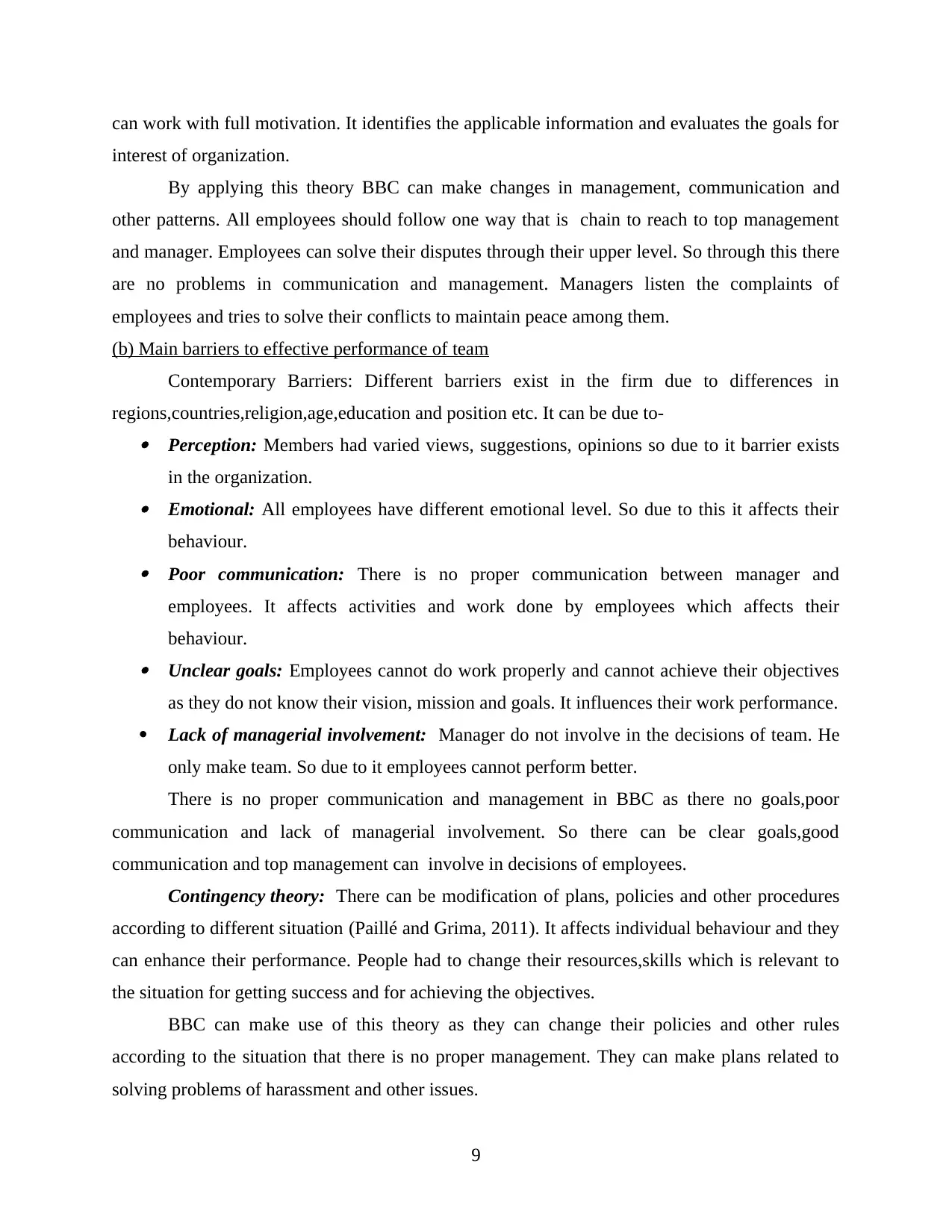
can work with full motivation. It identifies the applicable information and evaluates the goals for
interest of organization.
By applying this theory BBC can make changes in management, communication and
other patterns. All employees should follow one way that is chain to reach to top management
and manager. Employees can solve their disputes through their upper level. So through this there
are no problems in communication and management. Managers listen the complaints of
employees and tries to solve their conflicts to maintain peace among them.
(b) Main barriers to effective performance of team
Contemporary Barriers: Different barriers exist in the firm due to differences in
regions,countries,religion,age,education and position etc. It can be due to- Perception: Members had varied views, suggestions, opinions so due to it barrier exists
in the organization. Emotional: All employees have different emotional level. So due to this it affects their
behaviour. Poor communication: There is no proper communication between manager and
employees. It affects activities and work done by employees which affects their
behaviour. Unclear goals: Employees cannot do work properly and cannot achieve their objectives
as they do not know their vision, mission and goals. It influences their work performance.
Lack of managerial involvement: Manager do not involve in the decisions of team. He
only make team. So due to it employees cannot perform better.
There is no proper communication and management in BBC as there no goals,poor
communication and lack of managerial involvement. So there can be clear goals,good
communication and top management can involve in decisions of employees.
Contingency theory: There can be modification of plans, policies and other procedures
according to different situation (Paillé and Grima, 2011). It affects individual behaviour and they
can enhance their performance. People had to change their resources,skills which is relevant to
the situation for getting success and for achieving the objectives.
BBC can make use of this theory as they can change their policies and other rules
according to the situation that there is no proper management. They can make plans related to
solving problems of harassment and other issues.
9
interest of organization.
By applying this theory BBC can make changes in management, communication and
other patterns. All employees should follow one way that is chain to reach to top management
and manager. Employees can solve their disputes through their upper level. So through this there
are no problems in communication and management. Managers listen the complaints of
employees and tries to solve their conflicts to maintain peace among them.
(b) Main barriers to effective performance of team
Contemporary Barriers: Different barriers exist in the firm due to differences in
regions,countries,religion,age,education and position etc. It can be due to- Perception: Members had varied views, suggestions, opinions so due to it barrier exists
in the organization. Emotional: All employees have different emotional level. So due to this it affects their
behaviour. Poor communication: There is no proper communication between manager and
employees. It affects activities and work done by employees which affects their
behaviour. Unclear goals: Employees cannot do work properly and cannot achieve their objectives
as they do not know their vision, mission and goals. It influences their work performance.
Lack of managerial involvement: Manager do not involve in the decisions of team. He
only make team. So due to it employees cannot perform better.
There is no proper communication and management in BBC as there no goals,poor
communication and lack of managerial involvement. So there can be clear goals,good
communication and top management can involve in decisions of employees.
Contingency theory: There can be modification of plans, policies and other procedures
according to different situation (Paillé and Grima, 2011). It affects individual behaviour and they
can enhance their performance. People had to change their resources,skills which is relevant to
the situation for getting success and for achieving the objectives.
BBC can make use of this theory as they can change their policies and other rules
according to the situation that there is no proper management. They can make plans related to
solving problems of harassment and other issues.
9
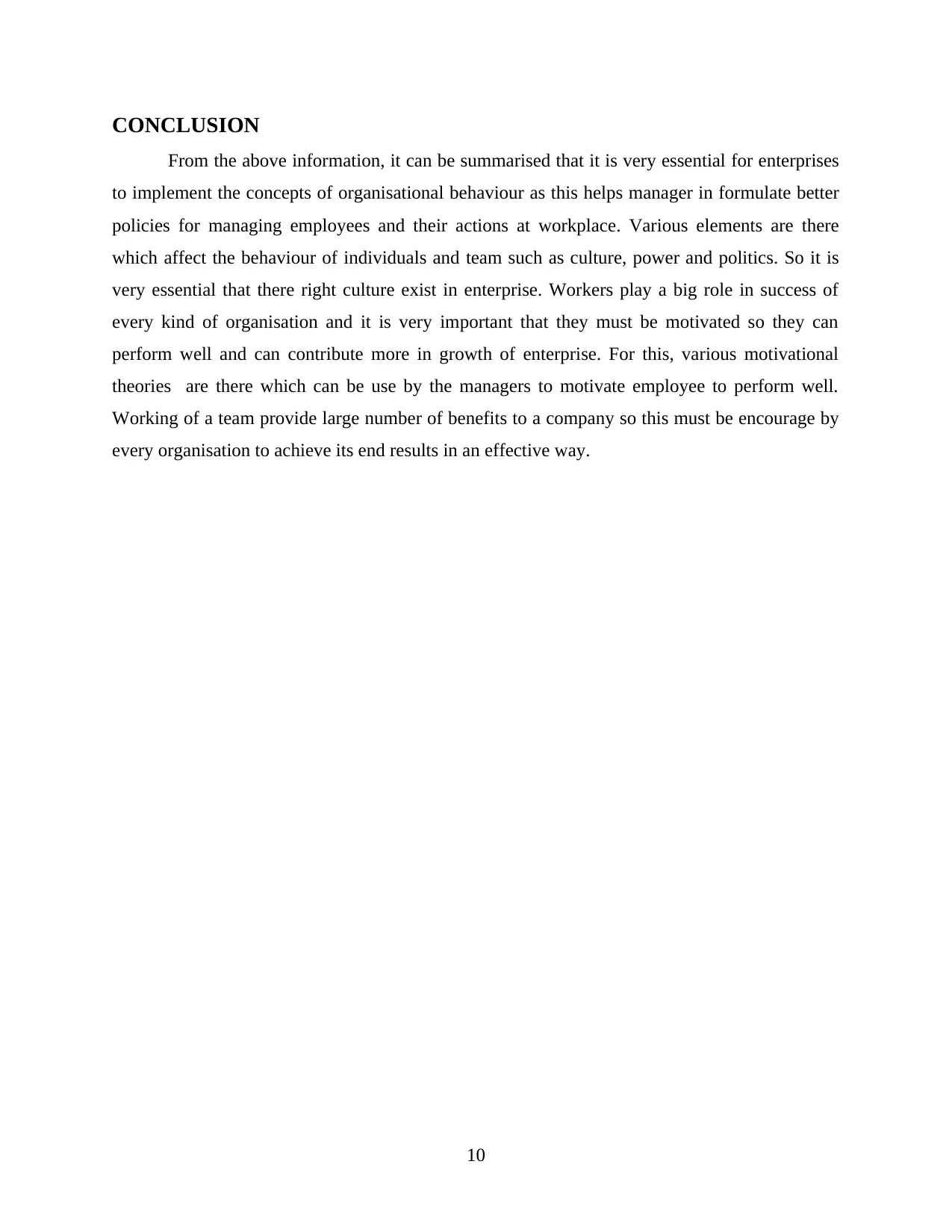
CONCLUSION
From the above information, it can be summarised that it is very essential for enterprises
to implement the concepts of organisational behaviour as this helps manager in formulate better
policies for managing employees and their actions at workplace. Various elements are there
which affect the behaviour of individuals and team such as culture, power and politics. So it is
very essential that there right culture exist in enterprise. Workers play a big role in success of
every kind of organisation and it is very important that they must be motivated so they can
perform well and can contribute more in growth of enterprise. For this, various motivational
theories are there which can be use by the managers to motivate employee to perform well.
Working of a team provide large number of benefits to a company so this must be encourage by
every organisation to achieve its end results in an effective way.
10
From the above information, it can be summarised that it is very essential for enterprises
to implement the concepts of organisational behaviour as this helps manager in formulate better
policies for managing employees and their actions at workplace. Various elements are there
which affect the behaviour of individuals and team such as culture, power and politics. So it is
very essential that there right culture exist in enterprise. Workers play a big role in success of
every kind of organisation and it is very important that they must be motivated so they can
perform well and can contribute more in growth of enterprise. For this, various motivational
theories are there which can be use by the managers to motivate employee to perform well.
Working of a team provide large number of benefits to a company so this must be encourage by
every organisation to achieve its end results in an effective way.
10
⊘ This is a preview!⊘
Do you want full access?
Subscribe today to unlock all pages.

Trusted by 1+ million students worldwide
1 out of 14
Related Documents
Your All-in-One AI-Powered Toolkit for Academic Success.
+13062052269
info@desklib.com
Available 24*7 on WhatsApp / Email
![[object Object]](/_next/static/media/star-bottom.7253800d.svg)
Unlock your academic potential
Copyright © 2020–2026 A2Z Services. All Rights Reserved. Developed and managed by ZUCOL.





